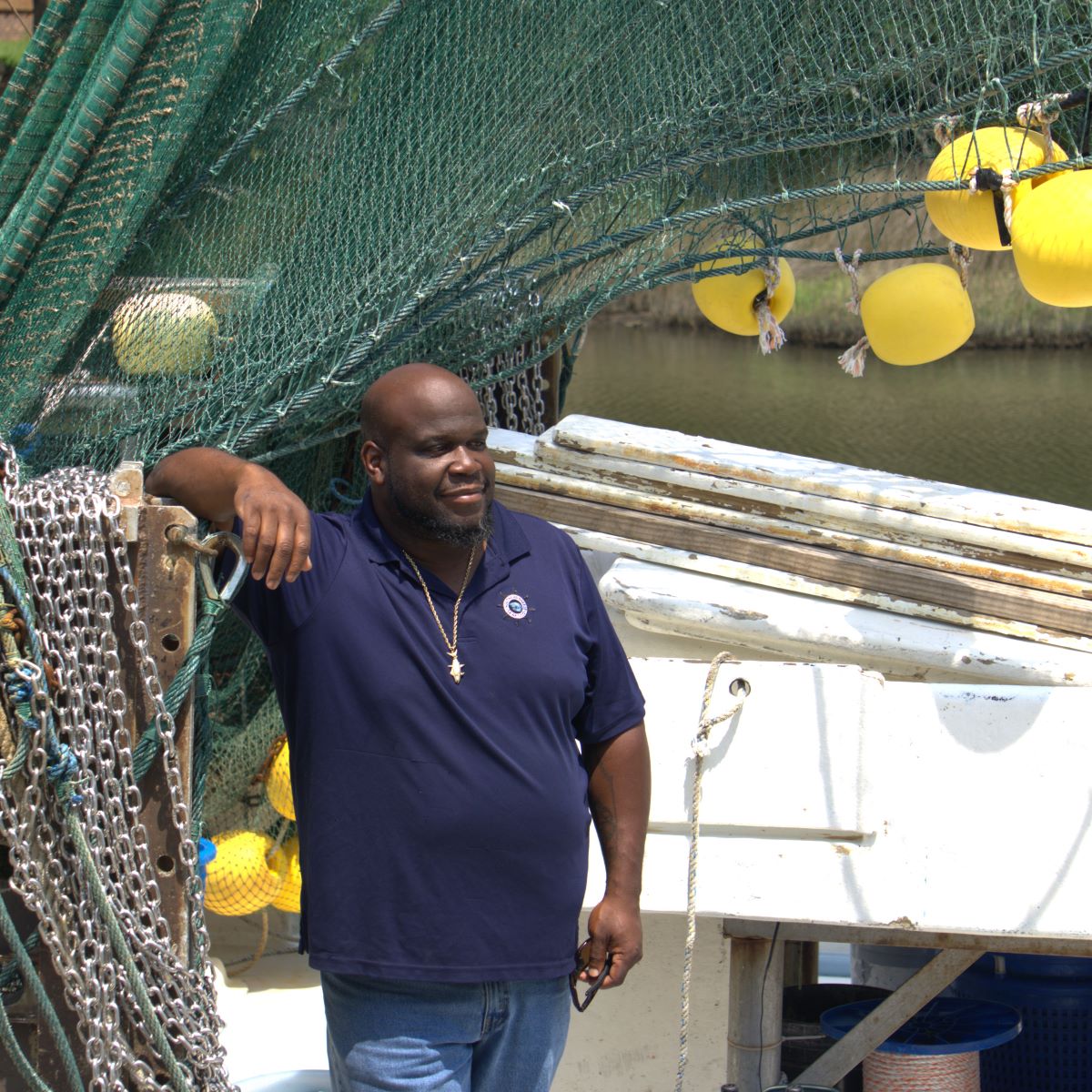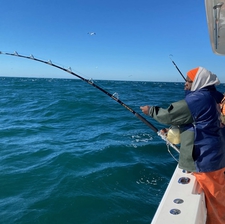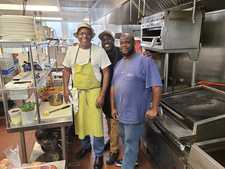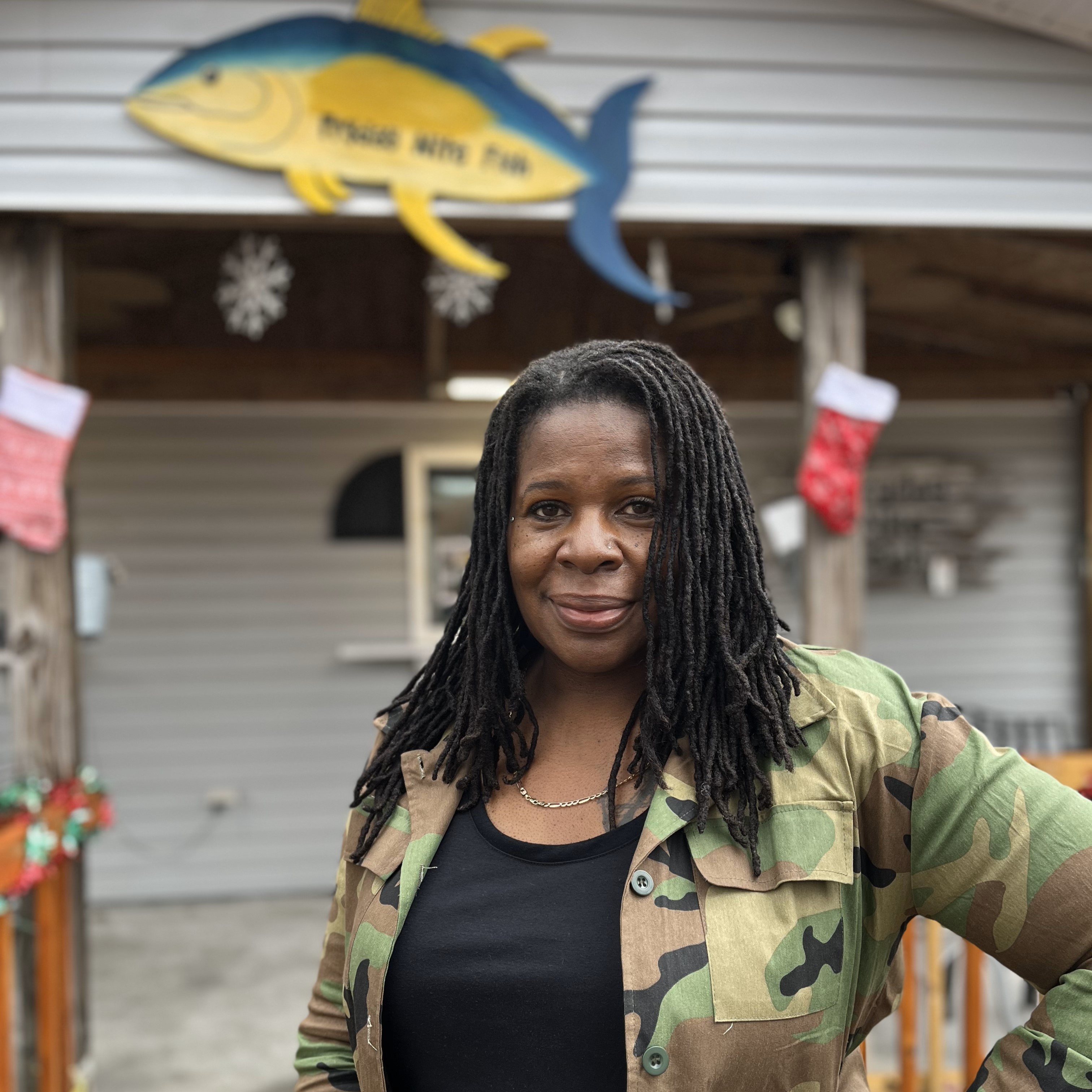The Fish Man: How a 14-year-old shrimper grew up to become a worldwide charter boat captain

By the time John Mallette started dropping a line off Ocean City Pier in the late ’70s, segregation had been illegal for 15 years. But a clear division remained between Ocean City Beach and the bordering “white” beaches on either side of the town. That didn’t stop white commercial fishermen from selling bait shrimp to African American anglers on the pier, and it didn’t discourage Mallette from making friends with those shrimpers.
“And that’s kind of how it started,” Mallette said of his commercial fishing and charter boat captain career.
______________________________
This story is part of NC Catch’s “Recognizing African American Participation in the North Carolina Seafood Industry” project. North Carolina’s Black seafood business community has partnered with researchers in this historic project conceived by NC Catch to build understanding of the vital role African Americans and people of color play in the state’s seafood industry. Narratives, video and oral histories tell the stories of Black fishers, wholesalers, chefs and others working in seafood. A N.C. Sea Grant 2024 Community Collaborative Research Grant has helped fund the project.
______________________________
Mallette was just 7 years old when he started fishing at Ocean City Beach in Onslow County. A Black doctor and white attorney founded the community in the late 1940s as a place where African Americans could enjoy the shore without being harassed. Ocean City Beach was also the only place on that stretch of coast where Black people could purchase waterfront property. Mallette’s parents were among the first families who bought a home there.
The white fishermen Mallette met lived in the nearby fishing village of Sneads Ferry, and Mallette soon landed a job at what is now a historic family fish house there. After years of working in commercial fishing and as a charter boat captain, Mallette today co-owns Southern Breeze Seafood retail and wholesale market in Jacksonville, N.C. But he does more than sell seafood.
Mallette educates people across the state about the vast array of N.C. seafood available to eat. He sells seafood to top chefs, stages cooking demonstrations at the N.C. Seafood Festival and was a force in revitalizing the Sneads Ferry Shrimp Festival.
Mallette shared his story in an interview with NC Catch’s “Recognizing African American Participation in the North Carolina Seafood Industry” project team. The following excerpts have been edited for length and clarity.
Tell us about your early days at Sneads Ferry Seafood (now Mitchell Seafood).
Whether it was packing fish or shoveling ice, or I would hop on a boat with somebody if anybody needed extra help. I was a little kid running around here aggravating people.
Were you the only African American kid working there or were there others?
I was the only one. There were some older guys.
And people welcomed you?
There's one thing about Sneads Ferry that I've noticed. I mean, you go anywhere in the South, there's some issue, you know, people care about race. But here, it's more of a class than race issue. If you're poor, you're poor, if you were rich, you rich. And that was kind of how people separated class, wasn't black or white, you know, it was haves and have nots. And the people that were "have nots" all stuck together. If you worked and if you were about something, everyone got along with you. Same today, no one cares what your skin color is. You work hard. If you're a good person, you're a good person. If you're not, you're not. And that's pretty much how everybody judges you out here.

As a charter boat captain, John Mallette has fished all over the world.
How did you move from working the fish house to going out on fishing boats?
There's a fisherman here. Mack Liverman. His boat was the Miranda. Now, it's called “Lady Ellen,” after Matt's wife. That's the first shrimp boat I ever worked on when I was a kid. Around 14 years old. And that's the first time I ever went out.
Were you chomping at the bit to get out on a commercial fishing boat?
You know, when you're a kid you want to do it. And even if it's not my boat, and even though I'm just holding the wheel for five minutes, I feel like yeah, I'm the captain, just for a minute. This is what I want to do. I want to make the best trip; I want to catch the most. I want to bring the biggest load because I want to be the hero for the day.
What were your duties?
Just pulling ropes, pretty much just clean up, stay out of the way. Mostly culling shrimp, you know, when you're dumping nets and separating the shrimp and the bycatch. And just keeping everything iced down and keeping the boat clean. Driving the boat when you're dragging. I still remember being told that if you can count, you can read numbers, you could stand on the milk crate and look at the compass. Keep it between this number and this number.
Your friends weren’t going out on a commercial fishing trip at that age?
My friends around here (Sneads Ferry), yes, but not my friends away from Sneads Ferry, like if I was back in Wilmington or something like that. No. Oh, no, no. I was the only one. And it was that way through high school.
It's funny because now I'm in my 40s, and I still have friends that I grew up with, and even now, they say, ‘Well, you've been doing that forever.’ That's what people know me for. I've always been the Fish Man. I remember being in middle school, in high school, and I was selling shrimp to my teachers. You know, I was hustling shrimp. I’d bring coolers and was taking orders and stuff. A lot of my teachers, I'm dropping seafood off to them…And actually, some of my teachers from high school are still my customers now. They come to my store. And they still remember, I would go to their house and sell them oysters and shrimp.
Those teachers must be proud of you now.
Yeah. I still remember my mom. Teachers would say, ‘Jonathan's not in school today.’ She was like, ‘I know where he's at. It's OK.’ It wasn't like I was skipping school to go get high or something else. I'm skipping school and was like, ‘Oh, here's (money for) your mortgage payment. Here's your electric bill. Here's all that.’ So, what's she gonna say? And she was the one that got me to stick with it.
Even though I had good grades, I never graduated high school. I dropped out, 10th grade. But I'm not ashamed of that. My mother retired from the employment office in Jacksonville. And she was the one that told me, you make just as much if not more money than your teachers. You already got a trade.’ She said, get your GED and go to work. That's what I did.
How did you move from commercial fishing to charter boat fishing work?
I just always wanted to go offshore. I would go offshore fishing with people just messing around like fun fishing for kings and mahi and things like that. Then I got up with another local fisherman when I was about the age of 14. He took me out grouper fishing for the first time and bottom fishing for grouper, and I fell in love with it. From that point on, that's what I stuck with. Got good enough at it to where some other people would ask me to fill in and run their boats. By the age of 17, I started working on some charter boats on the Outer Banks and some all up and down the East Coast. My first car, I had a little burgundy Toyota Corolla, and I would drive that thing up and down, up and down North Carolina..
And then I started running charters for Brant McMullan at Ocean Isle. He wasn't a lot older than I was. He actually helped me take the classes to get my captain's license. Once I got my captain’s license, I started running charters for him. After I worked for him, it's kind of all over the place. I commercial fished. And I ran private sport-fishing boats, traveling and fishing billfish tournaments…all over the place.

John Mallette sells seafood to top N.C. chefs including James Beard Award winner Ricky Moore and James Beard Award semi-finalist Jamie Davis, both NC Catch Chef Ambassadors.
Where have you traveled to fish?
A lot of Central (America), South America, Costa Rica, Panama, Mexico, Venezuela, Guatemala. All through the Bahamas. I was a fishing guide in Turks and Caicos for a while. Australia, Bermuda. Hawaii, I've ran charters in Hawaii, in Kauai, Nawiliwili Harbor. And then other places in the country. You know, California, Alaska. Through the Gulf. It's kind of all over.
Where is your favorite fishing area?
I'll say it's a tie between Panama and Australia. I'm gonna lean more towards Panama. Just because the fishing is just so good…It's just the amount of fish, the tunas, the black marlin, snappers literally acres and acres of spinner dolphins everywhere. It's literally like watching National Geographic.
And here in the U.S., North Carolina (is my favorite), by far. Because everything's here. And it's not just because I grew up here. Traveling the way I've traveled. If you can really, truly think about it and really put biases aside, North Carolina has probably some of the best fishing and the best seafood in the country. Some of the best tuna fishing from bluefins to yellowfins to you know, consistent tuna fishing. The inshore fishing, no matter how much people want to argue, and everything about fisheries regulations, and commercial versus recreational and whatever little ass civil war they trying to put together for no reason, the fishing's still better than almost anywhere. The red fish. The drum…just striped bass alone, and catfish, and just so many things, I just think all around...The tarpon fishery, everybody thinks Florida. Well, Pamlico Sound probably has some of the best tarpon fishing in the country. It's great fishing everywhere else, but you catch a whole lot of the same thing. Where in North Carolina, I got everything. At different times of the year. That's why it's awesome.
Throughout all your seafood industry experience, did you ever encounter, if not outright racism, but any barriers that you would attribute to being a person of color in an otherwise kind of white-dominated industry?
I mean, yeah. I'm not gonna say outright racism…but I will say a lot of stereotypes and a lot of assumptions. Because it's the old stereotype, you know, Black people can't swim and don't go out on the boats…But you go anywhere else in the world, and some of the best fishermen you ever run into, (are people) of color, you know what I mean? But for some reason, here, there's that stigma, too. But if, I will say, there's any barriers, it's just because people would make an assumption when they see me that I automatically don't know what I'm doing…because it's just not what you see…it's rare, to see a Black man do what I do for a living. But that's also what made me good at what I do, because I'm the type of person, you don't think I can do it, I will do it better than you.
You’ve said that through your years of fishing, especially off South Carolina and Georgia, you’ve seen more African American communities of shrimpers and commercial fishers than in North Carolina. Why do you think that’s the case?
Where is there inexpensive oceanfront in North Carolina? Or waterfront? Marsh-front? Any of that? But you go to South Carolina, around McClellanville, places like that. There's a lot of that. And I think it's a matter of you have places where they grew up, and they didn't have to get moved away…But over time, as you know, the property values went up and taxes go up, stuff like that. A lot of the African American families and just the families around here in general, had to move further inland because they couldn't afford to stay right on the water. So, what if you live inland? Well, you're not gonna grow up around the water to be a fisherman.
Do you love charter fishing, where you're carrying people on a boat to fish, as much as commercial fishing?
I enjoy both for separate reasons. The charter fishing and being good at it was what got me doing things. Like I started doing fishing seminars, and I've done TV shows, fishing shows on sports channels. And I saw how many people got into it, then people were like, ‘Hey, I'm buying a boat. Can you teach me how to run my boat? Can you show me this, show me that?’ So, I think I enjoy that part.
Commercial fishing, it's the freedom. Just going. You know, nowadays with Starlink and all these other things, we have internet offshore, but I tell people all the time it's just something about it, especially in the rat race we live in now, go 50, 80 miles, 100 miles offshore and cell phone doesn't work. Can't nobody bother you. They leave you alone. You have a whole different mental state, your whole mood's right. And then on the reverse, as soon as we're heading back to land, as soon as I see land, my whole mood changes. Because it's like, what's waiting on me when I get back to land? Soon as you get in cell phone range, your phone sounds like it's about to blow up because all the missed notifications all come through at one time. You're just like, sigh. Back to this.
You’ve mentioned how you strive to introduce African American communities to a wider variety of seafood options at your Southern Breeze Seafood market. Would you talk a little bit about that?
I grew up on the fried spots, and croakers and sea mullets, things like that. My retail market, most of my clientele are country folks. And when me and Randy (Randy Millis of Sneads Ferry, N.C.) opened up the market, yeah, we're gonna sell that, but we're also gonna sell number-one-grade tuna, high-end salmon, mahi, grouper, swordfish. And all these people said, you're not gonna be able to sell that to them country folks. I said, ‘Watch me.’
I cook stuff in the store. Let them try it. And then they're hooked. And now, you would never think this, and I know I'm bringing race into it, I've got these 50, 60-year-old country Black ladies coming in and I'm cutting up salmon and tuna for them to make poke bowls.
And then, teaching people alternatives, like when your doctor tells you ‘OK, you need to cut out red meat.’ I promise you right now, you've got a big fresh tuna steak, it's just like eating beef. Cook it the same way you want your steak. Medium? Cook it medium. Medium rare?
Swordfish, just last year at the State Fair, I did a sandwich as a chef demo for Got To Be NC and everybody loved it. Swordfish is an excellent alternative to pork. The texture of the meat. It's literally like cooking pork. I'm not talking about the vacuum sealed CO2-treated stuff you gonna buy in a grocery store. A fresh swordfish. Think of it like a really high-end thick pork chop. Cook it exactly the same way, season it the same. It will blow your mind.
Would you encourage or discourage fishing as a career?
If you want to decide that's what you want to do for a living, you got to be in 100 percent...It's more or less, ‘This is what I do, I gotta make it work.’ I have people oftentimes like ‘Man, I love to fish. Can I go out with you and do it?’ and then they figure out really quick, this ain't fun, fishing. They get onto the dock and they really, really appreciate their office job. They're happy to go back to work.
And boats breaking. Weather, it gets bad. And there's no retirement, there's no 401K. You don’t have benefits. You don't have revenue; you've got to figure it out. But at the same time, I wouldn't have it any other way.
Journalist Liz Biro wrote this report in 2025 based on a 2024 interview by Barbara Garrity-Blake. Photo by MasterMind Photography.





